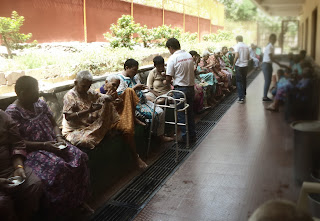Sustainable life
There is a great mismatch between
the technologies that we are blindfolded out rolling in the market to cater to
the non-analytical consumeristic desires of the people and the larger interest
of the increasingly clogging spaces in the society. While it is still morning
and you are fresh awake, faraway somewhere in the street there is a motorbiker
riding speedily in a certain mood and trying to warn the commoners to stay
aside by playing a tune to the horn of the vehicle, rather arrogantly and
aristocratically. Suddenly you find yourself in a critical mess created by this
complexity of the technologies. Until unless you have soundproof walls and a
bigger house to disseminate the unneeded, distracting and maddening voices, you
are bound to be doomed. In case you are part of the community permanently since
you own the accommodation, you are fated with a pang of chronic guilt and lifelong
frustration. All this is because we have to run the economy with a single goal
of creating wealth. There seems to be no space for social-psychological
effects. Bhutan has been doing a commendable job by curbing to such menace. It
has halted the decision of becoming the part of the BBIN (Bhutan - Bangladesh -
India - Nepal) corridor so that the traffic is controlled in the carbon negative
country. It needs a lot of foresight and a visionary leader with clear cut
priorities.
India is a country of more than
1.3 billion people and the country has the overall land space of less than 2.3
million sq. km of the world. In other words, 18% of the world population is
living in less than 3% of the world's land area. This is coupled with the
continuous increase in the inequality within the country as suggested by
various indices and national figures. There are fast sinking common spaces as
they are being privatized by the industrialist or an entrepreneur. The humans
are slowly cramming themselves into smaller spaces just like the way they treat
their other subjects as in the poultry business.
There is a serious lack of urban
and rural planning while developing the infrastructure of the country. Every
year while it rains, our drainage systems are clogged. This results into flood
within the city precinct and helpless citizens looking to save their lives.
India is one of the most risk-prone countries due to the increased effect of climate change. It is quite evident with the number of devastating cyclones
that we are facing every year. The floods and the drought simultaneously go on
within the country. There is heat waves and cold waves situation. The air is
being polluted with minute particles that enter into our lungs while breathing.
We all know that out of the 10 most polluted cities in the world, more than 6
are in India. New Delhi embarrasses us every year by breaking its record the
year before. In the year 2019, it saw unprecedented air smog in the air and for
more than a month, the air quality was far beyond the maximum calculative
capacity of the various indices. City administration vied for the curative
solutions by distributing few masks and publishing it heavily in the media to
gain the political cult. First, such solutions are uncalled for as it only
helps the richer section of the society, second, it is purely inhuman to even
wear a mask in the open air, and third, we need strong preventive measures that
are well coordinated inter-state and intrastate, far beyond the five-year terms
of the changing government in the center and the state.
The questions & problems are
clear and the solutions are clearer. We definitely lack the will to implement them.
Why can’t we promote public transportation and greener & healthier
solutions like cycling in the cities? A sustainable life is the richest
lifestyle. It accounts for all strata of society. Let us take a deep breath
and think!


Comments
Post a Comment